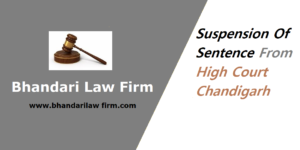Know About The Suspension of Sentence from High Court
Introduction: Section 389 of Criminal Procedure Code, 1973 provides for Suspension of Sentence. Section 389(1) and (2) both deals with the situation where a convicted person can get bail from Appellate Court after filling the Criminal Appeal. According to Sub-Section 3 of Section 389, if the person satisfies the Court by whom he is convicted that he intends to present appeal, the Court is required to order that the convicted person be released on bail. “Suspension” means to take or withdraw the sentence for the time being. It is an act of keeping the sentence in abeyance at the pleasure of the person who is authorized to suspend the sentence has the right to have the offender re-arrested and direct that he should undergo the rest of the sentence without assigning any reason Know The Suspension of Sentence By High Court
Brief Explanation Know The Suspension of Sentence By High Court
Section 389: Suspension of sentence pending the Appeal: Release of Appellant on Bail.
Sub-Section 1 provides, while the appeal pending by any convict, the Appellate Court may order that the execution of sentence or order appealed against be suspended and if the convicted person is in confinement, he may be released on bail or on his own bond. Further the Amendment Act, 2005 which provides that:
- The Appellate Court shall give notice to Public Prosecutor before releasing a convicted for an offence punishable with death, imprisonment for life or imprisonment for a term not less than 10 years.
- The Public Prosecutor should be permitted to move an application for cancellation of bail granted by the appellate court.
Sub-Section 2 provides that the power conferred by this section on the appellate Court may be exercised by the High Court also, in case an appeal by a convicted person to a Court subordinate there too.
Sub-Section 3 provides that if the convicted person satisfies the Court by whom he is convicted that he intends to present appeal, the court is required to order that the convicted person be released on bail.
- If he was already on bail and sentenced to imprisonment for a term not exceeding three years; or
- The offence of which such person has been convicted is bailable and the person is on bail.
The power under this Section is conferred on trial Court to grant bail if the convicted person shows his intentions to prefer an appeal.
According to Sub Section 4, when the appellant is ultimately sentenced to imprisonment for a term or to imprisonment for life, the time during which he is so released shall be excluded in computing the term for which he is so sentenced. Know The Suspension of Sentence By High Court
Also Read: Our Other Criminal Practice Areas
Power to suspend conviction and sentence pending appeal under section 389(1) can be exercised only when damage caused to the appellant cannot be undone if he ultimately succeeds. Trifling matters should not be taken in consideration. Loss of stipend etc. is not valid consideration. The moral conduct of public is a relevant consideration.
Stay of Conviction- Stay of conviction can be granted by the court under Section 389. But such stay can be granted only in exceptional and rare circumstances when non-grant of stay would lead to injustice and irreversible consequences. The person seeking a stay must draw attention if the appellate Court to specific circumstances that may arise if the conviction is not stayed otherwise stay cannot be granted.[2] In Ravikant S. Patel v. Sarvabhouma S. Bagli appellant in his application seeking a stay of his conviction under Section 376, IPC mentioning specific consequences of non-grant of stay i.e., that he would incur disqualification to contest-election. Considering the facts and circumstances of the case the High Court granted a stay of the conviction.
What is suspended under Section 389 is not the conviction or sentence. It is only the execution of the sentence or order which is suspended, and it is suspended not obliterated. Know The Suspension of Sentence By High Court
In Ramesh Kumar Singh v. Jhabbar Singh accused while on bail in another case committed the offence of murder in question. High Court during the pendency of appeal against conviction granted bail to accused. It was held by SC that the accused who miss utilized the liberty granted to his earlier was not entitled to the privilege of being released on bail. Cancelled and accused directed to be taken into custody forthwith. Know The Suspension of Sentence By High Court
Note: For any further information or any query you may contact us on 9855677966 or via email info@bhandarilawfirm.com



